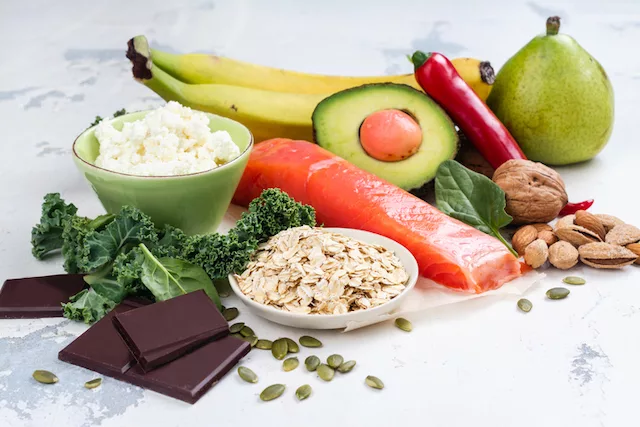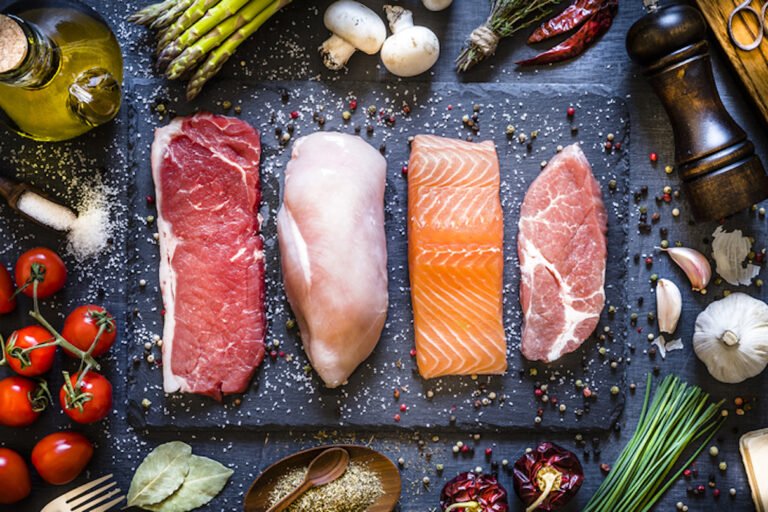There’s nothing like an insanely strong food craving to throw your diet for a loop… especially if it’s recurring. Maybe the thought of a decadent dessert is enough to send you running to the nearest bakery, or maybe a salty bag of crisps seems to be calling your name like clockwork. While a few treats here and there won’t do much harm (including during the holiday season, when eating for joy and happiness is much needed), cravings can develop into bigger health problems if they persist — and you just can’t resist — for long periods of time.
That said, some rumors swirl around the idea that certain amino acids can sweep in to curb your strongest cravings. Obviously, this could be true whether it’s sugar, carbs, or salty foods—or even depending on what type of snacker you are (think: stressed, tired, comfort-seeking, and the like). But is there any advantage to them?
In search of answers about the link between amino acids and cravings—as well as how protein fits into the larger question—we turned to a Brooklyn-based nutritionist Maddie Pasquariello, MS, RDof East Coast Health.
Can a deficiency of certain amino acids cause certain food cravings?
First, Pasquariello offers a quick recap of what amino acids are in the context of craving. “Amino acids are the building blocks of protein and are components of hormones, neurotransmitters and more. As a result, our reward systems are linked to protein intake,” he explains. It seems like amino acids and cravings could be linked, since we tend to feel pleasure from indulging them… but the nutritionist says the connection isn’t terribly strong.
“While the evidence is very limited when it comes to whether a specific amino acid deficiency can cause cravings, diets lacking protein-rich foods in general can lead to cravings—including foods that contain the amino acids that may be missing from diet”. she clarifies. Carbohydrate cravings are another such manifestation, occurring when the body is looking for a quick (and ideally tasty) source of fuel.

Regarding the research to date around specific amino acids, cravings and satiety, Pasquariello says a small study on tryptophan. It found that “a decrease in the tryptophan/large neutral amino acid (LNAA) ratio—which can be induced by eating high-protein meals—may reduce the overall urge to overeat in women.” Therefore, it suggests a possible link between amino acid intake and strong urges to indulge in desire.
Other amino acids, he continues, have been studied in the context of craving—but the jury is out since most lack clear and convincing evidence. These include:
- Tyrosine
- Phenylalanine
- Methionine
- Theanine
“Another amino acid that is often discussed as a potential aid in reducing cravings is glutamine,” continues Pasquariello. He says it has gained popularity in the craving conversation as it shows promise in encouraging weight loss especially in people with diabetes. However, data are lacking for those with blood sugar levels within normal limits.
5 tips to curb your most intense cravings
If you want to move the needle on your food cravings with significant success, consider the helpful, healthy dietitian-approved characters below.
1. Sleep well and fight stress
This advice is not good at all for your cravings and general well-being. Per a 2018 study in the magazine Portliness, chronic stress and higher cortisol levels predict food cravings and future weight gain. And ICYMI, your circadian cycles regulate not only your sleep-wake times but also your appetite. They also affect certain hormones in the endocrine system—including the hunger and satiety hormones ghrelin and leptin, respectively. Sleep deprivation (as well as stress) can suppress leptin and increase ghrelinthereby increasing hunger for processed, less-than-healthy foods.
Since these lifestyle habits can wreak havoc on your hunger cues, find ways to improve when you’re under pressure, too. Mindful movement, deep breathing, and a consistent bedtime routine are just a few of the countless self-care methods available to you.
2. Prioritize protein
When it comes to amino acids and cravings, Pasquriello ultimately advises against seeking out amino acids on their own (via specific foods or solo supplements). “A healthy, nutrient-dense diet usually contains all the essential amino acids the body needs to thrive, so there’s no reason for most people to seek out supplements or specific sources of a given amino acid,” he shares. “In fact, I’d venture that doing so could cause far more stress (and work!) than is necessary.”
That said, making sure you’re getting enough protein in your broader diet—along with carbohydrates, healthy fats, fiber, water, vitamins, and minerals—might just be the best solution to cravings. In addition to being inherently satiating, protein “is also vital for maintaining a healthy body weight, regulating our organ systems (as well as immune and metabolic), maintaining cellular structure and function, and building muscle Pasquariello continues.
Getting back to amino acids, it’s important to make sure you’re getting them all to reap the benefits of complete proteins. Animal foods will cover your bases easily, but Pasquariello notes that vegetarians and vegans may need to be more careful. However, it is perfectly possible to get all the amino acids and adequate protein in a plant-based diet. “For example, buckwheat, chia and hemp seeds are complete proteins on their own,” shares Pasquariello, “or you can choose complete protein combinations like hummus and pita, peanut butter on toast, or rice and beans.”
Suggestion: Blended into a smoothie or baked into treats, a plant-based protein powder like HUM’s Core Strength can help you increase your total protein intake more easily. (One serving offers 20 grams of protein with all 22 amino acids, including the 9 essential amino acids.)
3. Know your craving
By leaning into mindfulness, you may find that the causes behind your desire are easier to uncover and heal than you thought. “Instead of trying to prevent or ignore your cravings, try to tune in to – and even physically note – the circumstances in which they occur. Maybe you’re tired, bored at work, dehydrated, stressed or distracted.” He says that some desires may be even more context- or environment-dependent. (Think: getting popcorn and chocolate at the movies, getting ready for a tray of baked goods at holiday parties, or just experiencing seasonal food cravings.)
In any case, keeping track of the what and when behind your desires can help you understand them. From there, it can be easier to break the cycle.
4. Adopt mindful eating habits
Some of Pasquariello’s foolproof nutrition tips for reducing cravings and reducing emotional eating patterns include:
- Taking breaths between bites
- Avoiding distractions while eating
- Introducing mindset changes like eating 80/20 (ie, aim for nutrient-dense food at least 80 percent of the time)
- Reduce any noise around food, diet and weight that doesn’t serve you
5. Don’t deprive yourself (or demonize the craving)
Deprivation is prohibited – period. By eating a healthy, balanced diet first, you’ll have a better chance of keeping cravings for less healthy food at bay. However, it may be in your best interest to allow yourself the occasional treat… as long as you do it in moderation. “It’s well-established that ignoring your cravings makes your brain fixate on them even more, so trying to starve them or trade in an alternative may not cut it,” notes Pasquariello.
The amino acid pack…
In case you’ve heard that you can quell your cravings by prioritizing certain amino acids over others, doing so may prove to create more work (and possible stress) than any tangible reward. Instead, getting to know the true cause of your cravings—whether they’re rooted in lifestyle habits, emotional triggers, certain environments, or nutritional gaps—can allow you to reduce their power once and for all.
If you think your cravings are stronger than you can manage on your own, or if you think you’re deficient in a particular nutrient that could be causing severe hunger pangs, consult a doctor or dietitian. “They’ll do blood work and determine exactly what your diet might be missing, if anything,” says Pasquariello.
In general, though, Pasquariello notes that the magic trick to overcoming your cravings is probably simpler than it seems. Try to put aside the gimmicks and lofty goals, get back to the basics and take it easy on yourself. “Although it’s difficult, I believe a healthy balance can be achieved where we’re not fixated on numbers or hitting goals every day, but we can learn to better tune in to our body’s fullness and hunger cues,” concludes the nutritionist.
